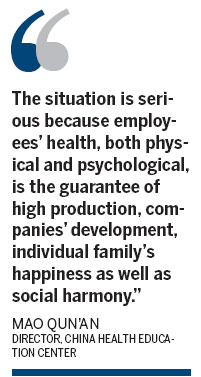Firms urged to help staff live healthily
Updated: 2012-05-28 08:02
By Liu Jie (China Daily)
|
|||||||||||
|
People receiveing free medical consultations with doctors from hospitals affiliated to Chongqing Medical University. This year, Bayer HealthCare will sponsor a project to popularize knowledge of health matters among employees in eight municipalities, provinces and autonomous regions, including Chongqing, Shaanxi, Gansu, Yunnan and Inner Mongolia. Chen Shichuan / For China Daily |
Project aimed at getting a better balance between work and rest
A survey conducted by China Health Education Center under the Ministry of Health shows that as a result of high pressure at work more than 80 percent of company employees in China are suffering from not only physical but also psychological problems and nearly half cannot maintain a healthy lifestyle.
The news prompted the center to cooperate with Life Times - a twice-weekly newspaper - to initiate a project called Health Education Tour for Chinese Enterprises' Employees last year to popularize knowledge of health matters among employees, offer health improvement suggestions and consulting services for them and help enterprises improve their corporate health management mechanisms, the organizer said.
As the first five-year large-scale educational series in China targeting professionals, the tour has acquired a good reputation and positive social effects since it launched last year. The activity this year was officially launched in late April. It will cover central and western regions - a vast and sparsely populated area, which accounts for two-thirds of the overall chronic morbidity in China.
This year's tour, sponsored by international drugmaker Bayer HealthCare, will last seven months and cover eight municipalities, provinces and autonomous regions, including Chongqing, Shaanxi, Gansu, Yunnan and Inner Mongolia. Sixteen enterprises, mainly engaged in energy, iron and steel, machinery and manufacturing, are expected to benefit from it.
In addition to the three fields of nutrition, emergency and cardiovascular disease - the focus last year - two major topics, chronic disease management and drug safety, will be added this year, according to local situations and actual concerns. Moreover, local experts are to be invited to give lectures on common diseases and patients' behavior according to the needs of different areas, said Mao Qun'an, director of the China Health Education Center.
The organizer said that Bayer HealthCare accumulated rich experience in the healthcare education areas in central and western areas when it expanded its business to the market previously untouched by multinational pharmaceutical companies. That's the reason it was chosen as the exclusive corporate sponsor of the tour to central and western regions.
Since the German-based company launched its Go-West Project in 2007 it had provided professional and systematic training to 3,500 doctors and 3,100 hospital executives by the end of 2011, enriching understanding of local residents' medical needs and regional characteristics.
"More than 100 experts have been invited to take part in this year's project. They are authoritative professionals able to explain medical issues in lively and interesting ways," said Mao.
 |
Xu Yancheng, chairman of Hubei Diabetes Society, said that central and western China's medical resources are in relatively short supply. The project in big enterprises will not only benefit employees but also help local residents - at least family members, neighbors and friends of the employees - to get related knowledge.
Statistics from the Ministry of Health show that the regions only had 10 percent of the medial care institutions in China in 2011 and one third of medical practitioners, while having 58 percent of the nation's population and 86 percent of the total area.
The project received an active response last year. During last May to September, an expert team composed of around 100 medical professionals traveled more than 70,000 kilometers to 52 big enterprises, including State-owned, private and multinational companies, in 30 cities to provide lectures and consulting services for more than 100,000 employees and corporate health management managers.
The team, under the guidance of the China Health Education Center, also conducted a survey, the results of which were released at the end of last year.
It showed that 35.6 percent of the 4,574 respondents working in big companies in China don't have time to do any physical exercise and only 6.4 percent of them exercise every day. Meanwhile, 30 percent do not have three regular meals daily. Problems include missing breakfast, not having a fixed-time lunch and heavy business dinners in the evening.
Psychological problems also exist, as 78.9 percent of the respondents said they sometimes suffer from nerves, 59.4 percent feel depressed and 6.25 percent had even lost a sense of control. Major causes of the feelings are related to work, such as high workloads and concerns about career development.
Faced with the problems, nearly 60 percent of those surveyed said they choose to rest and sleep and 53.6 percent listen to music to ease pressure. However, 10.9 percent choose smoking and 12.1 percent drinking to relax.
"The situation is serious because employees' health, both physical and psychological, is the guarantee of high production, companies' development, individual family's happiness as well as social harmony," said Mao, adding that corporate health management is still at a primary stage in China.
So far, an annual physical examination is the key tool for companies to offer health management for their employees, while a dynamic management mechanism - keeping a constant close watch on employees' physical and psychological conditions, preventing problems in advance and maintaining a healthy environment - has not been established yet in much enterprise in China.
The survey showed that employees really want such a mechanism because 80.2 percent of the respondents believe corporate health management is a good form of welfare and can help increase a sense of belonging. At the same time, 76.5 percent said a company's interest in health management may increase labor production and 53.7 percent said such a mechanism could help reduce losses in human resources.
Air China Ltd was one of the beneficiaries of the health tour last year. Liu Lijuan, a senior manager with human resources training and who works in the development department of the carrier, said that her company had been actively conducting health improvement activity internally but "what the project offered was more practical and professional".
"We have a dynamic management mechanism but, thanks to the experts' consultancy, we found we still need to improve," she added.
Contact the writer at liujie@chinadaily.com.cn
Today's Top News
Rescuers race against time for quake victims
Telecom workers restore links
Coal mine blast kills 18 in Jilin
Intl scholarship puts China on the map
More bird flu patients discharged
Gold loses sheen, but still a safe bet
US 'turns blind eye to human rights'
Telecom workers restore links
Hot Topics
Lunar probe , China growth forecasts, Emission rules get tougher, China seen through 'colored lens', International board,
Editor's Picks

|

|

|

|

|

|






